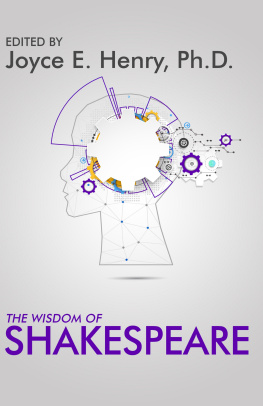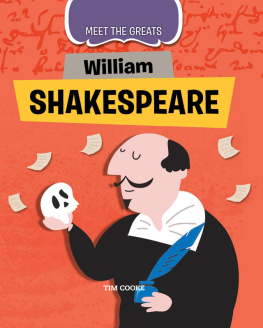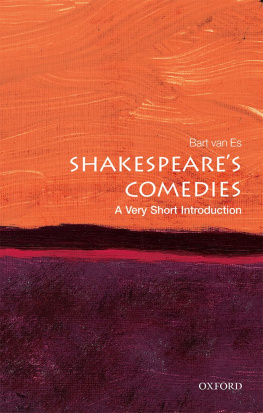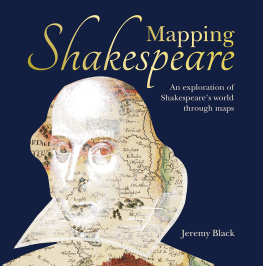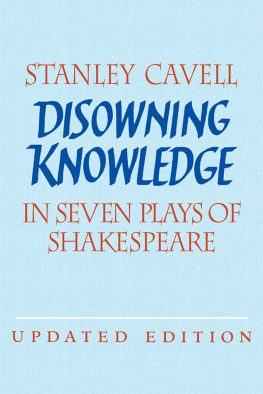The Wisdom of
William Shakespeare EDITED BY JOYCE E. HENRY, PH.D. Philosophical Library 
CITADEL PRESS
Kensington Publishing Corp.
www.kensingtonbooks
CONTENTS A man of Renaissance England, William Shakespeare encircles us in the twenty-first century. His plays are constantly in production throughout the world, and his words appear in headlines, editorials, advertisements, book titles, and comic strips. Shakespeare links cultures, centuries, generations, and genders. Born in Elizabeth Is reign in 1564, William Shakespeare grew up in Stratford-on-Avon, marrying Anne Hathaway from nearby Shottery when he was eighteen and she twenty-six.
Few records remain of their first decade together, except for the births of their three children, Susanna, Judith, and Hamnet; but by 1592 Shakespeare was recognized in London as a poet, playwright, and actor. During the next twenty-five years, until his death in 1616, he wrote thirty-seven plays, a canon which includes indisputably the greatest plays in the English language. The wisdom of Shakespeare shines in the speeches of his characters. Arranged here in rough chronological order by categories, some passages are familiar; some are not. Whether these are truly Shakespeares thoughts and attitudes, we do not know. Uttered by major and minor characters, and sometimes by those most unsympathetic, these lines reveal Shakespeares breadth of understanding of the diversity of humankind and his fascination with the motivations that drive behavior.
The enormous variety of his expressions is astonishing, and, despite the thousands and thousands of words in his works, he never repeats himself. The editions used were The Complete Works of Shakespeare edited by Hardin Craig and David Bevington (Scott, Foresman, & Co., 1973), and The Two Noble Kinsmen, edited by Lois Potter (The Arden Shakespeare, 1997). My appreciation goes to professors Louis A. DeCatur and Rebecca Jaroff for their helpful suggestions. Use this book to find a message for a friend or loved one, a passage for a special occasion, or simply to read and admire.
Joyce E. Henry earned her bachelors degree at the University of Michigan and her masters and doctoral degrees from the University of Wisconsin-Milwaukee.
Also a graduate of the Neighborhood Playhouse School of the Theatre in New York City, she worked as an actor, theater manager, and television moderator for a number of years, before joining the English department faculty of Ursinus College in Collegeville, Pennsylvania. As director of the theater program, she mounted more than a dozen Shakespeare productions, as well as A Matter of Conscience, her own play based on the life of Fanny Kemble. Currently she performs Shakespeares Women for the Pennsylvania Humanities Council and teaches Shakespeare at the Creutzburg Center in Radnor, Pennsylvania. (in chronological order)
| The Comedy of Errors | CE |
| Loves Labours Lost | LLL |
| The Two Gentlemen of Verona | TGV |
| The Taming of the Shrew | TS |
| A Midsummer Nights Dream | MND |
| The First Part of King Henry VI | 1 Henry VI |
| The Second Part of King Henry VI | 2 Henry VI |
| The Third Part of King Henry VI 3 | Henry VI |
| The Tragedy of King Richard III | Richard III |
| The Life and Death of King John | King John |
| Titus Andronicus | Titus |
| Romeo and Juliet | RJ |
| Venus and Adonis | V&A |
| The Merchant of Venice | MV |
| Much Ado About Nothing | Much Ado |
| The Merry Wives of Windsor | Merry Wives |
| As You Like It | AYLI |
| Twelfth Night | TN |
| The Tragedy of King Richard II | Richard II |
| The First Part of King Henry IV | 1 Henry IV |
| The Second Part of King Henry IV | 2 Henry IV |
| The Life of King Henry V | Henry V |
| Julius Caesar | JC |
| Alls Well That Ends Well | Alls Well |
| Measure for Measure | MforM |
| Troilus and Cressida | TC |
| Hamlet, Prince of Denmark | Hamlet |
| Othello, the Moor of Venice | Othello |
| King Lear | Lear |
| Timon of Athens | Timon |
| Macbeth | Macbeth |
| Antony and Cleopatra | A&C |
| Coriolanus | Coriolanus |
| Pericles | Pericles |
| Cymbeline | Cymbeline |
| A Winters Tale | WT |
| The Tempest | Tempest |
| The Famous History of the Life of King Henry VIII | Henry VIII |
| The Two Noble Kinsmen | TNK |
AADVICE: To thine own self be true Be that thou hopst to be, or what thou art Resign to death; it is not worth th enjoying.
York2 Henry VI III.i. First thrash the corn, then after burn the straw.
AaronTitus IV.ii Wisely and slow; they stumble that run fast.
Friar LaurenceRJ II.iii Look what thy soul holds dear, imagine it To lie that way thou goest, not whence thou comst: Suppose the singing birds musicians, The grass whereon thou treadst the presence strewd, The flowers fair ladies, and thy steps no more Than a delightful measure or a dance; For gnarling sorrow hath less power to bite The man that mocks at it and sets it light.
John of GauntRichard II I.iii When we mean to build, We first survey the plot, then draw the model; And when we see the figure of the house, Then must we rate the cost of the erection; Which if we find outweighs ability, What do we then but draw anew the model In fewer offices, or at last desist To build at all?
Lord Bardolph2 Henry IV I.iii Be it thy course to busy giddy minds With foreign quarrels.
King Henry IV2 Henry IV IV.v Love no man in good earnest; nor no further in sport neither than with safety of a pure blush thou mayst in honour come off again.
CeliaAYLI I.ii Beware the ides of March.
SoothsayerJC I.ii Be absolute for death; either death or life Shall thereby be the sweeter.
SoothsayerJC I.ii Be absolute for death; either death or life Shall thereby be the sweeter.
Reason thus with life: If I do lose thee, I do lose a thing That none but fools would keep: a breath thou art, Servile to all the skyey influences, That does this habitation, where thou keepst, Hourly afflict: merely, thou art deaths fool; For him thou labourst by thy flight to shun And yet runnst toward him still. DukeMforM III.i
The trifling of his favour, Hold it a fashion and a toy in blood, A violet in the youth of primy nature, Forward, not permanent, sweet, not lasting, The perfume and suppliance of a minute; No more. LaertesHamlet I.iii
Then weigh what loss your honour may sustain, If with too credent ear you list his songs, Or lose your heart, or your chaste treasure open To his unmastred importunity. LaertesHamlet I.iii
Be wary then: best safety lies in fear: Youth to itself rebels, though none else near. LaertesHamlet I.iii
These few precepts in thy memory Look thou character. Give thy thoughts no tongue, Nor any unproportiond thought his act.
Be thou familiar, but by no means vulgar. Those friends thou hast, and their adoption tried, Grapple them to thy soul with hoops of steel; But do not dull thy palm with entertainment Of each new-hatchd, unfledgd comrade. Beware Of entrance to a quarrel, but being in, Beart that th opposed may beware of thee. Give every man thy ear, but few thy voice; Take each mans censure, but reserve thy judgment. Costly thy habit as thy purse can buy, But not expressd in fancy; rich, not gaudy; For the apparel oft proclaims the man, And they in France of the best rank and station Are of a most select and generous chief in that. Neither a borrower nor a lender be, For loan oft loses both itself and friend, And borrowing dulleth edge of husbandry.
Next page
